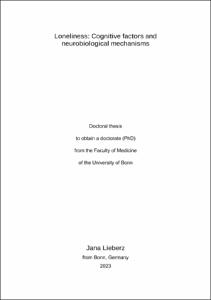Loneliness: Cognitive factors and neurobiological mechanisms

Loneliness: Cognitive factors and neurobiological mechanisms

| dc.contributor.advisor | Hurlemann, René | |
| dc.contributor.author | Lieberz, Jana | |
| dc.date.accessioned | 2023-05-10T14:12:38Z | |
| dc.date.available | 2023-05-10T14:12:38Z | |
| dc.date.issued | 10.05.2023 | |
| dc.identifier.uri | https://hdl.handle.net/20.500.11811/10831 | |
| dc.description.abstract | Loneliness is a painful condition with detrimental effects on physical and mental health. However, it is still unclear which mechanisms hinder lonely individuals from forming new social relationships which might alleviate their loneliness. The aim of the current thesis was thus to investigate potential factors contributing to the development or maintenance of loneliness. Specifically, alexithymia, a personality trait characterized by reduced emotional awareness, was examined as a predictor for loneliness. As alexithymia might lead to difficulties in forming new relationships during social transition phases, alexithymic traits of first-year students were assessed, and loneliness as well as perceived stress were monitored for six months during their first semester at university (study 1). Moreover, previous work indicated that the relationship between alexithymia and loneliness might be mediated by interpersonal trust, which is crucial not only for developing relationships but also for the beneficial effects of social interactions. Therefore, study 2 investigated to what extent reduced trust mechanistically contributes to impaired social interactions associated with loneliness. Ultimately, the hypothesized decreased emotional awareness and reduced interpersonal trust might promote social avoidance behavior, which might further foster loneliness. Hence, study 3 examined known behavioral and neural correlates of social avoidance in lonely individuals. The results of the current thesis provide evidence for loneliness as a vulnerability factor for increased stress experiences, which might drive the detrimental health effects of loneliness. Moreover, the predictive role of alexithymia for loneliness was confirmed, and diminished insular reactivity to emotional stimuli could be identified as a potential underlying mechanism of this relationship. Further support for the involvement of the anterior insula (AI) in loneliness was provided by study 2. As hypothesized, lonely individuals reported reduced interpersonal trust, and blunted AI functioning during trust decisions was associated with an attenuated affective and endocrinological responsiveness to a positive social interaction. A compromised neural integration of trust-related information might thus underlie impaired social interactions in loneliness. However, loneliness was not associated with correlates of social avoidance as known for social anxiety. Conclusively, the current thesis provides evidence for loneliness as a unique construct distinguishable from related psychopathology and offers important starting points for the development of scientifically based interventions. | en |
| dc.language.iso | eng | |
| dc.rights | Namensnennung 4.0 International | |
| dc.rights.uri | http://creativecommons.org/licenses/by/4.0/ | |
| dc.subject | Alexithymie | |
| dc.subject | Einsamkeit | |
| dc.subject | fMRT | |
| dc.subject | interpersonelles Vertrauen | |
| dc.subject | soziale Ängstlichkeit | |
| dc.subject | alexithymia | |
| dc.subject | loneliness | |
| dc.subject | fMRI | |
| dc.subject | interpersonal trust | |
| dc.subject | social anxiety | |
| dc.subject.ddc | 150 Psychologie | |
| dc.subject.ddc | 610 Medizin, Gesundheit | |
| dc.title | Loneliness: Cognitive factors and neurobiological mechanisms | |
| dc.type | Dissertation oder Habilitation | |
| dc.publisher.name | Universitäts- und Landesbibliothek Bonn | |
| dc.publisher.location | Bonn | |
| dc.rights.accessRights | openAccess | |
| dc.identifier.urn | https://nbn-resolving.org/urn:nbn:de:hbz:5-70792 | |
| dc.relation.doi | https://doi.org/10.1038/s41598-021-94799-w | |
| dc.relation.doi | https://doi.org/10.1002/advs.202102076 | |
| dc.relation.doi | https://doi.org/10.1523/JNEUROSCI.2029-21.2022 | |
| ulbbn.pubtype | Erstveröffentlichung | |
| ulbbnediss.affiliation.name | Rheinische Friedrich-Wilhelms-Universität Bonn | |
| ulbbnediss.affiliation.location | Bonn | |
| ulbbnediss.thesis.level | Dissertation | |
| ulbbnediss.dissID | 7079 | |
| ulbbnediss.date.accepted | 12.04.2023 | |
| ulbbnediss.institute | Medizinische Fakultät / Kliniken : Klinik für Psychiatrie und Psychotherapie | |
| ulbbnediss.fakultaet | Medizinische Fakultät | |
| dc.contributor.coReferee | Scheele, Dirk | |
| dcterms.hasSupplement | https://osf.io/csn5u/ | |
| dcterms.hasSupplement | https://osf.io/p6jxk/ | |
| dcterms.hasSupplement | https://neurovault.org/collections/BMDUCOHK/ | |
| dcterms.hasSupplement | https://neurovault.org/collections/VNYRMORR/ | |
| ulbbnediss.contributor.orcid | https://orcid.org/0000-0003-2167-8649 |
Files in this item
This item appears in the following Collection(s)
-
E-Dissertationen (2059)




